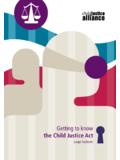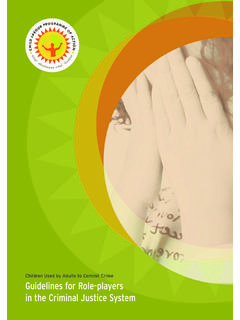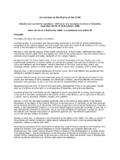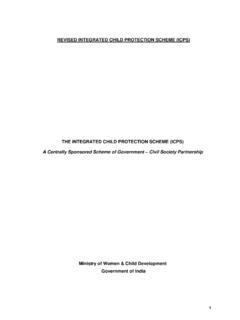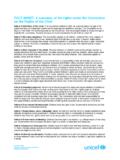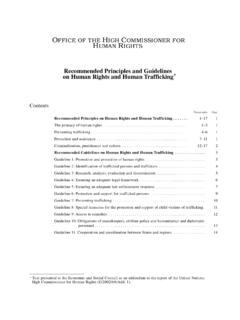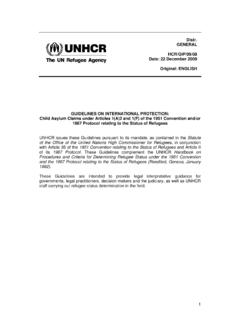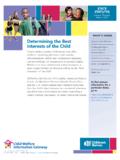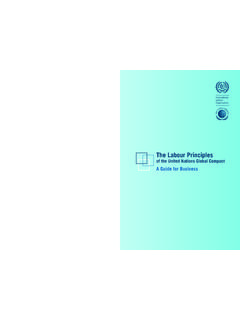Transcription of Child Justice in South Africa: Children’s Rights Under ...
1 Open Society Foundationfor South AfricaChild Justice in South africa : children s Rights Under ConstructionCompiled by Jacqui Gallinetti, Daksha Kassan and Louise Ehlers August 2006 CONFERENCE REPORTCONFERENCE REPORTC hild Justice in South africa : children s Rights Under ConstructionCompiled by Jacqui Gallinetti, Daksha Kassan and Louise EhlersOpen Society Foundationfor South AfricaAugust 2006 Acknowledgements The compilers of this report wish to express our sincere appreciation to all of the authors who kindly contributed their presentations in written form so that thispublication could be made possible. In particular Professor Jaap Doek, Chairperson of the United Nations Committee on the Rights of the Child , for his keynoteaddress and active participation in the also wish to thank Noma Kulu of the Open Society Foundation for South africa and Janine Demas of the Community Law Centre for their dedicated assistance inorganising the conferencePublished byThe Open Society Foundation for South AfricaFirst FloorColinton HouseThe OvalI Oakdale RoadNewlands 7700andThe Child Justice Alliancec/o Community Law CentreUniversity of the Western CapePrivate Bag X17 Bellville 7535 Copies of this publication can be obtained from.
2 The children s Rights Project, Community Law Centre, University of the Western Cape, Private Bag X17, Bellville 7535. Tel: +27 21 959 2950 Fax: +27 21 959 2411 Email: views expressed in this publication are in all cases those of the writers concerned and do not necessarily reflect the views of the Open Society Foundation for SouthAfrica, the Child Justice Alliance or the Community Law Centre, University of the Western No: 1-86808-638-0 Copyright Open Society Foundation for South africa and the Child Justice Alliance, 2006 Excerpts from this publication may be reproduced without authorisation, on condition that the source is Child Justice Bill is regarded by many activists in the field of Child Justice , children s Rights and Child protection as a progressive step to offer Child offenders the opportunity to take responsibility for their behaviour,the means to receive appropriate interventions in order to prevent re-offending and to be treated in a manner consistent with their age and vulnerability.
3 The Bill is an illustration of the manner in which South africa hasembraced the concept of children s Rights within the overall human Rights discourse and is striving to create a culture of dignity, fairness and equality for all. It is within this context of freedom and democracy that the Open Society Foundation for South africa has supportedthe work of civil society organisations in their efforts to promote the principles that form the foundation of ourconstitutional dispensation. The partnership between OSF-SA and the Child Justice Alliance in hosting the conference that resulted in this publication has been ongoing for a number of years and illustrates their mutualdesire to promote informed debate on Rights -issues pertinent to constitutional development, in particular the promotion of the Rights of children in the criminal Justice system.
4 This publication encapsulates the range of discussion and debates that occurred during the conference. It alsoserves as a record of the proceedings that can be widely disseminated to provide further insight and awareness onchild Justice developments thus far and the challenges still facing children who come into conflict with the law. ZZoohhrraa DDaawwooooddExecutive DirectorThe Open Society Foundation for South AfricaDecember 2006 ContentsPart 1: IntroductionJacqui Gallinetti, Daksha Kassan and Louise EhlersP7 Part 2: Conference papersChild Justice trends and concerns with a reflection on South africa p11 Professor Jaap Doek A short history of time : charting the contribution of social development service delivery to enhance Child Justice 1996- 2006p17 Professor Julia Sloth-Nielsen A reflection on Child Justice legislation, policy and practicep29 Raesibe TladiDevelopment of diversion within the National Prosecuting Authorityp37 Advocate Maggie Tserere Case review teams.
5 children awaiting trial in detention in the Western Capep47 Advocate Bronwyn PitheyThe development of minimum standards for diversion programmesp51 Lukas Muntingh and Louise Ehlers A decade of case law in Child Justice p65Dr Ann Skelton Child offenders and life imprisonmentp77 Carina du Toit First baseline study monitoring the current practice of the criminal Justice system in relation to children : some preliminary findingsp85 Daksha Kassan The use of children in illicit activities: Child Justice and Child labour meet p103 Jacqui Gallinetti children in detention pending trial and sentence p113 Amanda DisselChildren s involvement in gangs and violent crime - the COAV Cities Project and its implications for South Africap125 Cheryl FrankPart 3: DeliberationsSummary of deliberations and conference outcomesp135 Closing remarks: from the sandpit?
6 P139 Professor Julia Sloth-Nielson p71H Bayes, The Age of Agendas for children , International children s Rights Monitor, 2000, Vol. 13, No. 2, Bayes, op cit Gallinetti, Daksha Kassan and Louise EhlersThe importance of civil society and government collaborationSouth African civil society has an illustrious past with a strong tradition of advocacy and lobbying in the context ofthe struggle against apartheid. These activities continued in the transition to a democratic form of governmentand are still emerging in various forms today. One of the areas in which the advocacy efforts of civil society have made a tremendous impact and still has muchscope for further action is the field of children s Rights .
7 The UN Convention on the Rights of the Child (CRC) isalready over 15 years old and is the most widely ratified human Rights document. In terms of article 4, StateParties to the CRC are bound to take all appropriate legislative, administrative and other measures for the imple-mentation of the Rights recognised therein. The obligation therefore rests with the State to ensure that nationallaws comply with and include the Rights contained in the CRC. However, this does not mean that civil society, andnon-governmental organisations in particular, do not have a meaningful and essential role to play in ensuring thatnational laws protect and enshrine the Rights of is recognised that progress in establishing a children s Rights culture is often due to governmental collaborationwith NGOs and this has manifested itself in the drafting process of the CRC as well as in the monitoring of State simplementation of the argues that the importance of NGOs in assisting and exerting pressure on gov-ernment is due to the fact that NGOs have particular knowledge of a Child s situation.
8 Can consult with children andare able to identify effective means of intervention and are a number of ways that NGOs can contribute to ongoing children s Rights work in relation to include assisting in service delivery, research, providing expertise in training, monitoring government actionboth nationally and internationally (the latter by reporting to the Committee on the Rights of the Child ) and exposing human Rights abuses. In addition, in South africa , our Constitution contains a number of provisions that facilitate the participation ofcivil society in interacting with government in order to achieve both accountability and this tradition of civil society and governmental co-operation in striving to protect the Rights of children ,the Open Society Foundation for South africa and the Child Justice Alliance recently convened a conference entitled Child Justice in South africa : children s Rights Under construction.
9 The purpose of the conference was totake stock of the situation relating to the criminal Justice system for children in conflict with the law. AlthoughSouth africa has been on the brink of new law for Child offenders for the last few years, such law reform has notas yet become a reality and children who commit crime are still treated in a manner that is similar to the wayadults are treated in the criminal Justice system. PART 1 IntroductionThe rationale behind the conferenceThe recognition of this need for a separate Child Justice system dates back to the early 1990s, as it is argued thatthe Child Justice law reform process was initiated by non-governmental organisations that launched advocacy cam-paigns to focus attention on children who were being detained for allegedly committing common criminal offencesas opposed to offences that were political in nature and linked to the struggle against campaignsincluded the Release a Child for Christmas Campaign , the No Child Should Be Caged campaign, as well as theefforts of the Community Law Centre.
10 Which contracted university students to intervene informally in the criminalcourts and provide assistance to arrested children , specifically in the form of trying to secure their release fromcustody awaiting 1996 a Project Committee of the South African Law Reform Commission (then the SALC) was established toinvestigate law reform relating to Child offenders. This Project Committee was comprised of a number of experts inmatters relating to children and included a number of presenters at this conference, including Dr. Ann Skelton aswell as Professor Julia Sloth-Nielsen and Advocate Maggie Tserere. In July 2000 the Project Committee releasedits report together with the Child Justice Bill.


